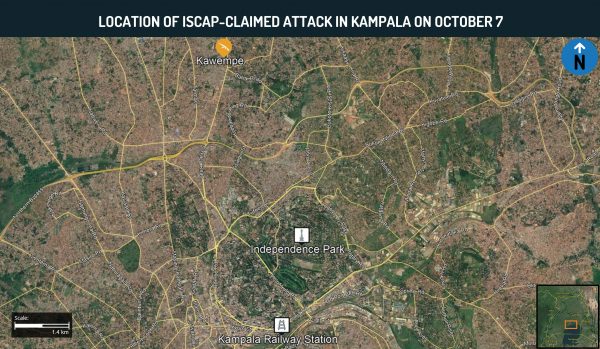10
Oct 2021
15:49 UTC
Uganda Alert: Islamic State claims IED attack against police post in Kampala’s Kawempe Division on October 8; first ever attack claimed in country
Please be advised
- On October 8, the Islamic State’s Central Africa Province released a claim of responsibility for an IED attack against a police post in Kampala’s Kawempe Division “yesterday”.
- The claim notes that the attack was conducted by an IS cell, and that it caused injuries among the police forces as well as material damage.
- As of writing, there was no media reporting corroborating the occurrence of this incident.
Assessments & Forecast
- This is the first ever attack in Uganda claimed by the Islamic State (IS). Although small-scale in nature, the claim was likely designed to signal the group’s presence in Uganda. Some caution is warranted given the complete absence of reports regarding this incident by both Ugandan and international media even though an IED incident at a police station would typically receive at least local coverage. Nonetheless, IS tends to carefully use its media channels and refrains from claiming attacks that do not occur in order to maintain its public legitimacy, and thus it is unlikely that the organization would have completely fabricated the incident altogether.
- However, the group is known to exaggerate at times and instrumentalize small-scale attacks perpetrated by its militants or even remotely-affiliated elements to serve its propaganda purposes. To that end, it is possible that the group amplified a small incident that went unreported by the media, especially given that Kawempe Division is remote from central Kampala and considering the sporadic recurrence of higher-profile petrol bomb attacks in the city. Despite the claim mentioning casualties and material damage, it was likely fairly minor and the perpetrators had limited capabilities with regards to assembling the IED.
- The fact that IS released this claim of responsibility officially and under the name of its Central Africa Province is indicative of the significance with which IS is treating the event. This means they are seeking to display an image of an organized attack as well as a notable presence in Kampala, rather than having this incident attributed to “lone wolf” activity. This is additionally emphasized by the reference to a “security cell” conducting the attack.
- This also follows several incidents in recent months that the Ugandan government has linked to militants and mostly the Allied Democratic Forces (ADF), which is the more commonly used name for the group, though it is part of IS’s Central Africa Province. Most recently, on October 4, security forces killed a militant in Kampala whom they said was involved in a foiled suicide attack in Northern Region in August. Four suspects linked to the ADF were also arrested in Kampala in July in connection with an assassination attempt. It is notable that IS did not claim any association with these previous developments in Uganda and may suggest that the group now sought to capitalize on these allegations to assert their presence.
- FORECAST: Given the small size and low sophistication of this incident, the overall threat of IS attacks in Kampala is limited. While the absence of reporting of the incident have thus far allowed the authorities to remain silent, they might instrumentalize a future successful security operation to show their superiority and ability to mitigate the militant threat. Regardless, this incident in concert with the recurring developments attributed to the ADF is likely to keep security forces at relatively higher alert. Security forces are likely to enhance intelligence-gathering efforts, including re-interrogating previously arrested militants, and could intensify security operations in Kampala over the coming days and weeks.
Recommendations
- Travel to Kampala can continue while adhering to general security precautions regarding crime.
- Maintain heightened vigilance in the regions bordering DRC and South Sudan due to the presence of rebel groups and the potential spillover of armed conflict from neighboring countries.
COUNTRY RISK LEVEL
Medium
AFFECTED AREA
Kampala, Uganda
INCIDENT RISK LEVEL
Medium
STRENGTH OF SOURCE
Unconfirmed
Please be advised
- On October 8, the Islamic State’s Central Africa Province released a claim of responsibility for an IED attack against a police post in Kampala’s Kawempe Division “yesterday”.
- The claim notes that the attack was conducted by an IS cell, and that it caused injuries among the police forces as well as material damage.
- As of writing, there was no media reporting corroborating the occurrence of this incident.
Assessments & Forecast
- This is the first ever attack in Uganda claimed by the Islamic State (IS). Although small-scale in nature, the claim was likely designed to signal the group’s presence in Uganda. Some caution is warranted given the complete absence of reports regarding this incident by both Ugandan and international media even though an IED incident at a police station would typically receive at least local coverage. Nonetheless, IS tends to carefully use its media channels and refrains from claiming attacks that do not occur in order to maintain its public legitimacy, and thus it is unlikely that the organization would have completely fabricated the incident altogether.
- However, the group is known to exaggerate at times and instrumentalize small-scale attacks perpetrated by its militants or even remotely-affiliated elements to serve its propaganda purposes. To that end, it is possible that the group amplified a small incident that went unreported by the media, especially given that Kawempe Division is remote from central Kampala and considering the sporadic recurrence of higher-profile petrol bomb attacks in the city. Despite the claim mentioning casualties and material damage, it was likely fairly minor and the perpetrators had limited capabilities with regards to assembling the IED.
- The fact that IS released this claim of responsibility officially and under the name of its Central Africa Province is indicative of the significance with which IS is treating the event. This means they are seeking to display an image of an organized attack as well as a notable presence in Kampala, rather than having this incident attributed to “lone wolf” activity. This is additionally emphasized by the reference to a “security cell” conducting the attack.
- This also follows several incidents in recent months that the Ugandan government has linked to militants and mostly the Allied Democratic Forces (ADF), which is the more commonly used name for the group, though it is part of IS’s Central Africa Province. Most recently, on October 4, security forces killed a militant in Kampala whom they said was involved in a foiled suicide attack in Northern Region in August. Four suspects linked to the ADF were also arrested in Kampala in July in connection with an assassination attempt. It is notable that IS did not claim any association with these previous developments in Uganda and may suggest that the group now sought to capitalize on these allegations to assert their presence.
- FORECAST: Given the small size and low sophistication of this incident, the overall threat of IS attacks in Kampala is limited. While the absence of reporting of the incident have thus far allowed the authorities to remain silent, they might instrumentalize a future successful security operation to show their superiority and ability to mitigate the militant threat. Regardless, this incident in concert with the recurring developments attributed to the ADF is likely to keep security forces at relatively higher alert. Security forces are likely to enhance intelligence-gathering efforts, including re-interrogating previously arrested militants, and could intensify security operations in Kampala over the coming days and weeks.
Recommendations
- Travel to Kampala can continue while adhering to general security precautions regarding crime.
- Maintain heightened vigilance in the regions bordering DRC and South Sudan due to the presence of rebel groups and the potential spillover of armed conflict from neighboring countries.



